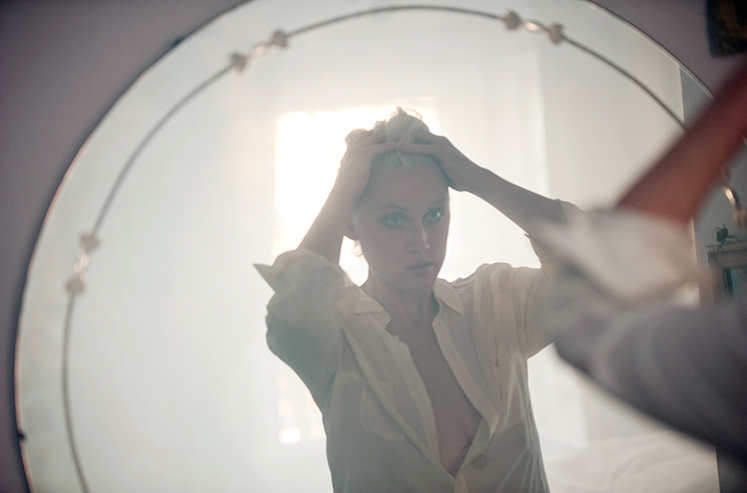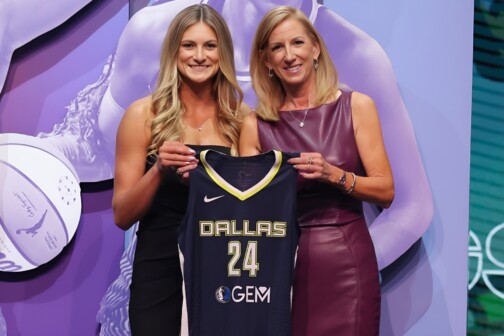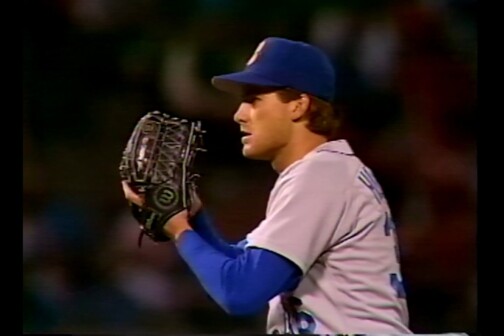The following interview ran in our August issue. This is an extended version. — CM
Sarah Jaffe started her life in music as a teenager in Deep Ellum, playing open-mic nights with her parents nearby. She has since gone on to a career that has seen her touring extensively with national acts and collaborating with producer Symbolyc One (Kanye West, Jay Z, Beyoncé). One of their first tracks landed on Eminem’s most recent album. This month, Jaffe is back with a new record of her own, Don’t Disconnect, her third full-length. It’s the first produced by Midlake drummer McKenzie Smith, after working with John Congleton (St. Vincent, The Walkmen). We caught up over milkshakes at Highland Park Soda Fountain, ahead of her tour with the Polyphonic Spree.
What’s changed in your life between the second and third records—The Body Wins and Don’t Disconnect?
Writing has gotten a little harder. I think once it becomes a day job you just don’t think about it the same. It’s just not “new” anymore. For some reason in the past year and a half—and even with The Body Wins—at home, I’ll write a verse and then I get to the first chorus, and I can’t move past the first chorus. I don’t know if it’s because I’d get too excited, but I just couldn’t make the second verse happen. Until I get in the studio. I need that applied pressure to push me a little bit. From start to finish, this record was a little bit more lighthearted for me because it was like, “I know it’s going to get done.” I know I can do it, it’s just a matter of being in the studio with other people. I have to hear McKenzie play drums for me to hear a song differently. I have to bring in an actual piano player or an actual synth line.
I have to hear it for me to be excited about a song, because I can only do so much with demos at home. I work in GarageBand. It’s a lot of fun. I mean, it’s instant gratification. I’ll make layers and play metal shelves and make it sound like a snare. That part is really fun for me, but I’ll get so wrapped up in that, that I can’t finish a song. I think overall, it’s just work for me. Which is good, but it’s just hard work.
So, with The Body Wins in particular, I started a process of just bringing in demos or really short clips of songs. And just kind of freaking out in the studio: “What am I gonna do?” I just couldn’t finish a f*cking song. That was still kind of the problem. I went to Marfa for this record for almost two weeks, going with the intent of: I’m just gong to write and write and lock myself away and that’s all I’m going to do—just write for this record. And it wasn’t f*cking happening. It just wasn’t happening. I just mentally broke down.
So when you said that the new record is more lighthearted, do you think the music reflects that?
Lyrics are always going to be really important for me, and lyrically it’s not as … I don’t want to say “dark,” implying that the Body Wins is really dark, and there are some dark moments on that record, but this one feels a little bit poppier. This was just fun. The collaborative effort was working, especially with McKenzie. He and I are good friends, so we just have that energy of, “Let’s just make something that we like.”
If I came in with a 50-second demo, Mckeznie would just start tracking drums, and while he was tracking drums, I would finish the second and third verse. I had my spot on the couch and I would just sit down and listen to the drum loop or the melody over-and-over and I would just finish that. By the time he was ready to finish tracking drums, I was ready to track scratch vocals or a synth line or something like that. It was just fun. Things happened quickly and it felt like home to me because I’m used to making demos at home and just wanting to hear things right then.
You said that lyrics are really important. Can you think of a song that’s great lyrically where the music just doesn’t live up to the lyrics? Does that ever happen?
All the time. There are a few top 40 radio songs. Leonard Cohen has a lot of them.
That’s a great example.
I can’t really get into Leonard Cohen. I’m just like: bor-ing [Laughs].
[Laughs]
But lyrically, I’m just like, “Wow.” You know?
Yeah.
All my friends hate me for saying this, but I can’t f*cking do Tom Waits. I can’t f*cking do it. You secretly hate me; you’re like: “F*ck you, I love Tom Waits.” But I can’t do it.
No, I’m with you 100 percent. I’ve liked some versions of his music. I love the Scarlett Johansson covers and everyone hates them. Everyone hates them. My dad loves Tom Waits.
I was thinking about that the other day, what a f*cking brat I am because I can’t stand … I won’t say I can’t stand it, but I can’t get past the voice. I just can’t do it. But Scarlett Johansson’s “Falling Down”—it’s so good. Plus, she’s hot.
I didn’t notice. You have a recording project with Symbolyc One called The Dividends. That resulted in work with Raekwon of Wu-Tang Clan, as well as Eminem. Is your process different when writing hooks for rap songs?
So different. In that there’s no thought of how I should be, or how I should sound. He messaged me on Twitter and it was sometime after the Cannabinoids remixed one of my songs. He wrote me and was like, “Hey, do you want to write some hip hop hooks?” And of course, to me that was like, yes. Because I love hip hop. 90s RnB, hip hop. I love it, I eat it up. The fact that he was messaging me and taking a chance on me; I was like, “Oh my god, who told you I loved this sh*t?” Because no one knew that, or a lot of people didn’t. That’s always been a dream of mine, is to write, not only for other artists, but for pop and hip hop hooks. So here was this green light and a door that just swung open. I was in the process of moving and he sent me this track and it was f*cking awesome. It just came so naturally and it felt so fun and right. I recorded it in the driveway when we were moving. I recorded it in my car. I sent it back to him, and I titled it “Bad Guy.” Three months later he says, “Eminem wants the song.” To see the title move from this file on my laptop [and to an Eminem record] is just a fun moment. Because we worked so well together, and he was like, “Why don’t we just make a project out of this? Whatever we don’t sell, we’ll just keep it in an archive. And let’s write full songs now.”
How much is in the archive?
We have an EP that is just kind of hanging out right now. He’s so busy. I think he was in New York recently with Madonna, so I’m sure that the Dividends are probably at the bottom of the list for him.
It was so awesome. Larry, S1, is such a cool person. He’s constantly working, he has a million projects going on and he’s constantly creating projects and giving opportunities to other people. After that moment he just kept sending me beats and tracks and we just shuffled stuff out and starting building an archive. So he just started sending me tracks for us, and then we made the Dividends out of it.
He’s also worked with Kanye West. If I asked him, ‘Who is more difficult to work with: Sarah Jaffe or Kanye West?,’ what do you think he’d say?
Kanye, most definitely. [Laughs] Kanye.
You went with McKenzie Smith of Denton’s Midlake as a producer on the new record, as opposed to John Congleton. They’re extremely different as recording engineers, but they’re two of the most noteworthy producers in the area. What are some similarities and what are some differences between them?
I think the biggest similarity is that they’re both down to try anything. Any idea. Anything. I would ask, “What if I did this?” Insecure, I would come to the table with a half-hearted, drenched-in-self-doubt idea. And they would be like, “Yeah, do it. Absolutely.” Both of them are incredibly supportive. They’re both really positive people. I think with Congleton, 80 percent of the time, acted as my psychiatrist and helped me work through mental blocks. I would imagine that’s probably a lot of what a producer does, especially Congleton who is working with a wide stylistic variety of artists. Everyone from John Grant to St. Vincent to—I know he worked with David Byrne. I’m sure the different energies that are thrown at him are insane. And he just listens to a lot of bitching and a lot of self-involved talk. I can’t imagine, but I can. He rolls with it and he’s brilliant at it. I see that in McKenzie, too. He’s just glad to be doing it. The thing that’s great about working with McKenzie is that I just felt like we were on the same page with each song. I could hear how I wanted the song to be in my head and he understood that without me having to say it a lot of times, which is great. In my head that’s what makes a great producer, an understanding of each artist as they are when they come to you, which both of them have. The biggest difference, is definitely the sense of humor. They’re both hysterical, but John has, as you would imagine, a darker sense of humor. To me, he’s like an older brother. He’s like a gross older brother. He just wants to get a reaction out of you and he’ll always get a laugh out of you. McKenzie’s just giggly. He’s just funny. He’s laughing all the time. We just joke around. We shoot the sh*t a lot in the studio and joke. A lot of laughter. And giggles.
You’ve been playing in Deep Ellum since your teens. What do you remember about that experience that you don’t think you’d see or hear in today’s Deep Ellum?
That’s a hard one, Chris.
I know it’s hard.
It’s a hard one because I’m an entirely different person. My first show was at an open mic night.
Was it Club Dada?
Mmhmm. I’m almost positive I was still in high school. My parents were with me, I know that. While I was playing there was a band setting up behind me, and I think about what I would do now. First of all, the very thought of an open mic is mortifying. No f*cking way.
I still go to them. Think about that. Not always on purpose, but I still see them.
They make me cringe. I can not do it. I think that says a lot about me. I think I was much braver when I was young. There were no ideals. There were no misconceptions, preconceived whatever. It was none of that. I just wanted to do it and I did whatever I wanted. Now I think it’s just clouded with my own … shit. The thought of me playing an open mic is terrifying. I don’t think I could do it.
You think that would be harder than a sold-out show?
I think it takes more guts, yeah. To grab people’s attention? Playing a sold-out show, I mean, it’s done. But playing an open mic night—half the crowd doesn’t give a f*ck and half the crowd is kind of trying to pay attention to you.
You’ve lived in both Denton and Dallas, and they can be tiny scenes for such a large region. How are you treated in public in Dallas versus Denton?
Oh, f*ck, Christopher. [Long sigh and pause]
Is that like dismantling a bomb?
Kind of. No, a disclaimer: I should say that I’m beyond grateful for Dallas’ support. I mean, you’re right. They’re so close together but the scenes are entirely separate. They’re two separate things. I just feel my anxiety is a little higher here. That’s just because of me. I don’t like going out really, and strangers coming up and saying stuff.
Did that not happen as much in Denton?
It doesn’t happen at all. I’m trying to find a classy way to say it.
I understand.
I love Dallas. I definitely consider it my hometown, but Denton has a good chunk of my heart.
It doesn’t really have a celebrity culture.
No. I mean, the Midlake guys have been living there for x-amount of years and no one thinks they’re cool. [Laughs] You know what I’m saying? They’re f*cking awesome. They’re clearly cool, but they’re not treated as…
They’re not singled out.
Yeah. Is that a bad answer?
No. That was great.
You’re just going to send me like [Makes headline gesture], “Midlake’s not cool.” [Laughs]
No. [Laughs] That is what journalists do. I won’t do that, though. Is there a North Texas artist or band you admire that you don’t feel gets enough credit?
Yeah, absolutely. I think Daniel Hart is one of the most brilliant musicians I’ve ever met. Granted, he’s done very well for himself. It’s all a matter of what you think is successful. I think he’s very successful. He works constantly; he writes for other artists; he scores films. As far as being well known, is he well known? Probably not. I would imagine about as well known as me; he’s well known here. But I think he’s a brilliant writer. There are a lot of people. Robert Gomez, who plays with me. Midlake does amazingly well in Europe, but not so well here. I think they’re a group of some of the most talented musicians I’ve ever seen. Watching them play every night is amazing. These are all well-studied, grown-ass people, who love playing music and because they’ve been doing it for such a number of years, to me, that’s success: Longevity. They’re doing well. I could see how looking from the outside people might not think … there’s such a weird illusion to fame and all that bullsh*t.
So, occasionally my parents will ask why I have to use such ugly language in my writing. Since you’ve gone from being a more acoustic and folk-based act to collaborating with rappers, is there surprise from your family and friends at the paths you’ve taken? Or is everyone always supportive?
I think musically my family has always been cool. I think the biggest thing for my parents was probably my hair getting cut, which is so stupid. They’re like, [Elderly voice] “Oh, you cut your hair.” Some people took as a reflection of me evolving my sound, but I just wanted to cut my hair. My family has known me from the beginning so they know what I like. When I do something musically it makes sense to them. They’ve always been supportive. My dad loves the stuff I did with the Dividends, which was surprising to me. But he loves it and encourages me to put it on my record, and confuses the two, which drives me crazy. They’re great. My family’s great.
If you could wave a wand and change one thing about the local music scene, what would it be?
I think it’s important to be supportive of whatever is local. There are a lot of bands that I don’t like or I wouldn’t particularly see them play. I think it’s nice to be nice. It’s hard not to talk sh*t. It’s really hard. I’m as guilty of it as the next person. It’s really hard, especially when something is bad. But you can’t. You can’t do it. You’ve got to be nice. I just want to be supportive. If people want to do stuff, go for it. I don’t have to like it.
Why on earth didn’t you order a butterscotch milkshake?
Because it f*cking sucks. Butterscotch sucks.
Sarah Jaffe will perform at the Majestic Theatre on Saturday, August 23, to mark the release of her newest record. Josh T. Pearson will be the supporting act.




